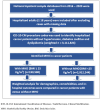Rising Trends in Metabolically Healthy Obesity in Cancer Patients and Its Impact on Cardiovascular Events: Insights from a Contemporary Nationwide Analysis in the USA (2016-2020)
- PMID: 38792362
- PMCID: PMC11122494
- DOI: 10.3390/jcm13102820
Rising Trends in Metabolically Healthy Obesity in Cancer Patients and Its Impact on Cardiovascular Events: Insights from a Contemporary Nationwide Analysis in the USA (2016-2020)
Abstract
Background: Obesity or overweight raises the risk of developing 13 types of cancer, representing 40% of all cancers diagnosed in the United States annually. Given the ongoing debate surrounding the impact of metabolically healthy obesity (MHO) on cardiovascular outcomes, it is crucial to comprehend the incidence of Major Adverse Cardiovascular and Cerebrovascular Events (MACCEs) and the influence of MHO on these outcomes in cancer patients. Methods: Data of hospitalized cancer patients with and without obesity were analyzed from the National Inpatient Sample 2016-2020. Metabolically healthy patients were identified by excluding diabetes, hypertension, and hyperlipidemia using Elixhauser comorbidity software, v.2022.1. After that, we performed a multivariable regression analysis for in-hospital MACCEs and other individual outcomes. Results: We identified 3,111,824 cancer-related hospitalizations between 2016 and 2020. The MHO cohort had 199,580 patients (6.4%), whereas the MHnO (metabolically healthy non-obese) cohort had 2,912,244 patients (93.6%). The MHO cohort had a higher proportion of females, Blacks, and Hispanics. Outcomes including in-hospital MACCEs (7.9% vs. 9.5%; p < 0.001), all-cause mortality (6.1% vs. 7.5%; p < 0.001), and acute myocardial infarction (AMI) (1.5% vs. 1.6%; p < 0.001) were lower in the MHO cohort compared to the MHnO cohort. Upon adjusting for the baseline characteristics, the MHO group had lower odds of in-hospital MACCEs [adjusted odds ratio (AOR) = 0.93, 95% CI (0.90-0.97), p < 0.001], all-cause mortality [AOR = 0.91, 95% CI (0.87-0.94); p < 0.001], and acute ischemic stroke (AIS) [AOR = 0.76, 95% CI (0.69-0.84); p < 0.001], whereas there were higher odds of acute myocardial infarction (AMI) [AOR = 1.08, 95% CI (1.01-1.16); p < 0.001] and cardiac arrest (CA) [AOR = 1.26, 95% CI (1.01-1.57); p = 0.045] in the MHO cohort compared to the MHnO cohort. Conclusions: Hospitalized cancer patients with MHO exhibited a lower prevalence of in-hospital MACCEs than those with MHnO. Additional prospective studies and randomized clinical trials are imperative to validate these findings, particularly in stratifying MHO across various cancer types and their corresponding risks of in-hospital MACCEs.
Keywords: acute ischemic stroke; acute myocardial infarction; cancer; cardiac arrest; major adverse cardiovascular and cerebrovascular events; malignancy; metabolically healthy obesity; mortality.
Conflict of interest statement
The authors declare no conflicts of interest.
Figures
Similar articles
-
Cardiovascular outcomes in metabolically healthy Asian-American population with obesity (18-44 years): Insights from the National Inpatient Sample.Obes Pillars. 2025 Jan 10;13:100158. doi: 10.1016/j.obpill.2025.100158. eCollection 2025 Mar. Obes Pillars. 2025. PMID: 39927248 Free PMC article.
-
Long-Term Prognosis of Acute Myocardial Infarction Associated With Metabolic Health and Obesity Status.Endocr Pract. 2022 Aug;28(8):802-810. doi: 10.1016/j.eprac.2022.05.007. Epub 2022 May 30. Endocr Pract. 2022. PMID: 35654337
-
Acute ischemic stroke in young adults: comparative analysis of outcomes and mortality in metabolically healthy obese or overweight vs. non-obese or overweight hospitalizations, 2016-2019 cohort.J Stroke Cerebrovasc Dis. 2024 Sep;33(9):107847. doi: 10.1016/j.jstrokecerebrovasdis.2024.107847. Epub 2024 Jul 6. J Stroke Cerebrovasc Dis. 2024. PMID: 38977229
-
The Association between Metabolically Healthy Obesity, Cardiovascular Disease, and All-Cause Mortality Risk in Asia: A Systematic Review and Meta-Analysis.Int J Environ Res Public Health. 2020 Feb 19;17(4):1320. doi: 10.3390/ijerph17041320. Int J Environ Res Public Health. 2020. PMID: 32092849 Free PMC article.
-
The association between metabolically healthy obesity and risk of cancer: A systematic review and meta-analysis of prospective cohort studies.Obes Rev. 2020 Oct;21(10):e13049. doi: 10.1111/obr.13049. Epub 2020 Jun 1. Obes Rev. 2020. PMID: 32476278
Cited by
-
Impact of Metabolically Healthy Obesity on Cardiovascular Outcomes in Older Adults with HFpEF: Insights from a Nationwide Sample.J Clin Med. 2025 Aug 4;14(15):5495. doi: 10.3390/jcm14155495. J Clin Med. 2025. PMID: 40807115 Free PMC article.
-
Atrial fibrillation and ischemic stroke in cancer: the latest scientific evidence, current management, and future directions.J Thromb Thrombolysis. 2025 Apr 26. doi: 10.1007/s11239-025-03104-3. Online ahead of print. J Thromb Thrombolysis. 2025. PMID: 40281267 Review.
References
-
- Obesity and Overweight [Internet] [(accessed on 21 April 2024)]. Available online: https://www.who.int/news-room/fact-sheets/detail/obesity-and-overweight.
-
- CDCBreastCancer “Talk to Someone” Simulation [Internet]. Centers for Disease Control and Prevention. [(accessed on 11 March 2024)];2023 Available online: https://www.cdc.gov/cancer/survivors/life-after-cancer/talk-to-someone-s....
LinkOut - more resources
Full Text Sources



